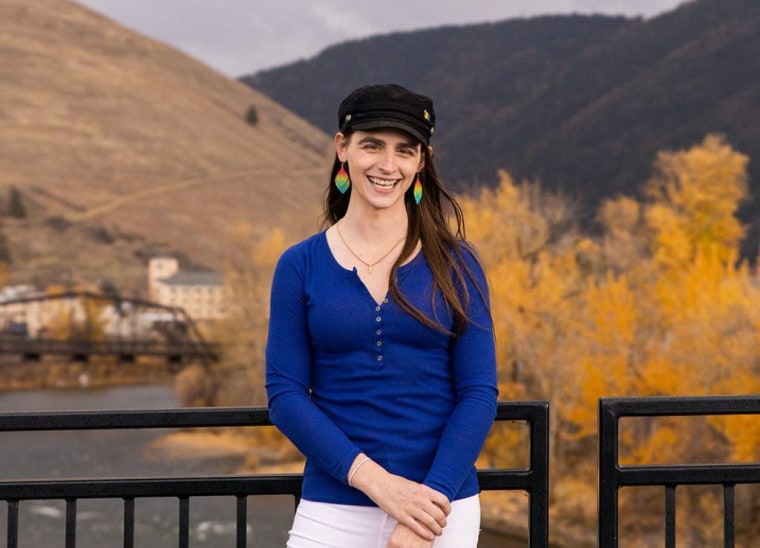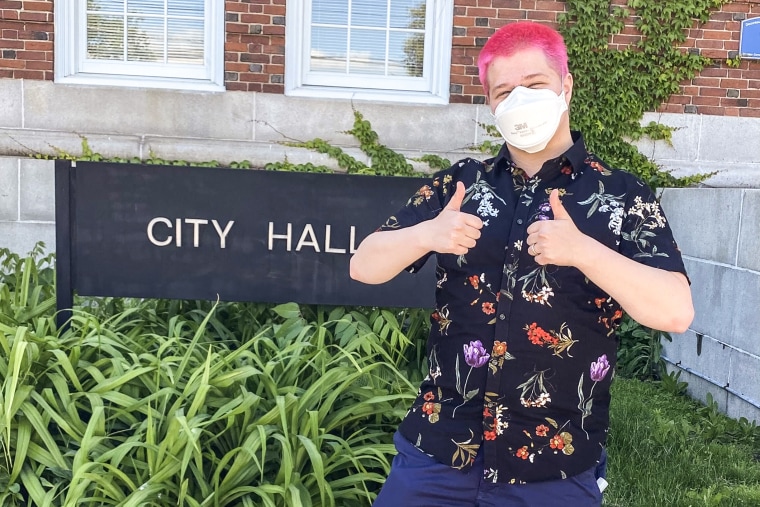These recently elected trans lawmakers say anti-LGBTQ bills inspired them to run
Zooey Zephyr, the first out transgender woman elected to the Montana Legislature, was inspired to run after her state passed three pieces of legislation targeting the LGBTQ community.
One of the bills passed last year allows parents to remove their children from sexual education classes dealing with LGBTQ issues, another prohibits trans students from competing on sports teamsthat do not correspond with their “biological sex,” and a third requires Montanans to show proof of having had their sex “changed by surgical procedure” before updating the gender marker on their birth certificate. The third bill could have been stopped by one votein the Montana Senate.
“My goal has always been to be in the room where my voice can do the most good,” the Democrat told NBC News after her win this month.
Zephyr said she had been working with the city of Missoula to draft human rights legislation but came to the conclusion that real change would have to be made at the state level.
“It became clear that is where the bulk of the attacks and damage was happening, and that was the most valuable room to be in,” she said.

So far this year, at least 340 anti-LGBTQ bills have been proposed in state legislatures across the United States, with more than 140 targeting transgender rights specifically, according to Human Rights Campaign, the country’s largest LGBTQ advocacy group.
Gabriele Magni, an assistant professor of political science at Loyola Marymount University in Los Angeles and the founding director of the university’s LGBTQ+ Politics Research Initiative, said this wave of bills inspired an increasing number of queer candidates to run “to protect LGBTQ rights.”
“If you have so many more candidates, some of them are going to be strong candidates,” he added.
The historic number of bills targeting LGBTQ rights coincided with a record number of openly lesbian, gay, bisexual, transgender and queer political candidates: At least 1,065 LGBTQ people ran for office this year, with an estimated 416 running for seats in state legislatures, according to an October report from the LGBTQ Victory Fund, an organization that supports queer people running for office. Of these 416 candidates, 281 made it to the general election, and 185 won — an Election Day win rate of 66%, its post-election analysis found.
The success of these candidates means that more openly LGBTQ people, including more transgender and nonbinary people, will hold office in state legislatures than ever before. Once all of the newly elected officials are seated, there will be nine transgender state legislators (up from eight this year) and nine nonbinary state legislators across the U.S., according to the LGBTQ Victory Institute, the group’s research arm.
One of those new legislators will be New Hampshire’s James Roesener, a Democrat, who became the first transgender man elected to a state legislature in the U.S. this month, according to the group.
The 26-year-old said he decided to run for office due, in part, to the wave of anti-LGBTQ legislation introduced in states across the country, including in New Hampshire.
“Especially as a trans person, seeing all of the new political action happening towards my community really kind of inspired me to be a voice for trans people to be visible and help be a concrete part of making these decisions,” he said.
There were at least five anti-LGBTQ bills proposed in the New Hampshire Legislature this year, according to Freedom for All Americans, though none of these measures were successful. One bill sought to prevent trans girls and women from participating on female school sports teams, while another would have added gender-affirming care to the state’s definition of child abuse.
Roesener’s platform included expanding nondiscrimination laws in health care, affordable housing, raising the state minimum wage to at least $15 per hour and legalizing marijuana.
“I think that people do care about others,” he said. “I think people are all concerned about really basically the same thing. It’s like, are we going to have enough food to eat? Do we have a roof over our heads? Am I going to have time with my family off of work? These are very unifying issues.”

Get the Morning Rundown
Get a head start on the morning’s top stories.SIGN UPTHIS SITE IS PROTECTED BY RECAPTCHA PRIVACY POLICY | TERMS OF SERVICE
Another new state legislator will be Leigh Finke, who earlier this month became the first transgender person elected to the Minnesota state Legislature. She told the Minnesota Reformer in June that her decision to run was “largely in response to the building anti-trans movement and seeing bills introduced and laws starting to pass last year” in her home state and beyond.
“It suddenly became an absolute top-level priority for state-level Republicans to attack trans communities and not just to make it a talking point, but to actively take away rights from trans people and trans youth,” she said.
Finke specifically mentioned a bill proposed in Minnesota last year that, if it had passed, would have made participation in girls’ athletics or accessing a women’s locker room a misdemeanor for trans girls. The bill failed, but she told the Minnesota Reformer that it “really shook me and made me realize that someone has to be in the room.” Starting Jan. 3, she will be that someone.
‘Real, tangible effects on trans people’
State legislatures have increasingly become battlegrounds over LGBTQ rights. Republicans began introducing legislation targeting queer rights at an increased clip in the wake of the 2015 Supreme Court ruling in Obergefell vs. Hodges, which legalized same-sex marriage nationally.
In 2017, Republicans introduced 129 bills targeting LGBTQ rights, many of which focused on issues of religious freedom. Last year, the number of such bills introduced grew to 191, with advocates calling 2021 the “worst year in recent history for LGBTQ state legislative attacks” when 17 of these bills were enacted into law.
This year, at least 340 such bills have been introduced in 23 states, with at least 25 bills becoming law in 13 states so far, according to the Human Rights Campaign.
More than 40% of these proposed bills specifically target transgender people, limiting trans people’s ability to play sports, use bathrooms that correspond with their gender identity and receive gender-affirming health care. At least 17 of these bills have become law, the Human Rights Campaign said.
“The legislation has real, tangible effects on trans people and their families that love them and their communities that care for them,” Zephyr said. “I lost friends who fled the state, and I lost friends who ended their lives.”
A strategy that ‘probably backfired’
Whether or not bills targeting the LGBTQ community — particularly transgender people — pass, they act as a “wedge issue” to motivate right-wing voters in advance of an election, Magni said.
He said this strategy worked in the primaries by helping conservative candidates raise money and motivate their base to show up at the polls.
“But then in the general election, when you have a broader electorate, it didn’t really work. It didn’t convince moderate voters,” Magni said. “As an electoral strategy, it probably backfired.”
In addition to inspiring people such as Zephyr, Roesener and Finke to run for office, he said, this strategy may have also helped pro-LGBTQ candidates fundraise and may have motivated supporters to head to the polls.
Given the Democrats’ better-than-expected performance in the midterms, Republicans could change course with their legislation, though Magni and Zephyr said they expect to continue to see anti-LGBTQ bills for the time being.
“We are seeing pre-filed legislation in Tennessee, in Montana, in states across the country,” Zephyr said. However, she believes bills targeting LGBTQ rights are ultimately a losing strategy.
“My feeling is, the more the right pushes this, the more they will lose. People are standing up for us,” she added.